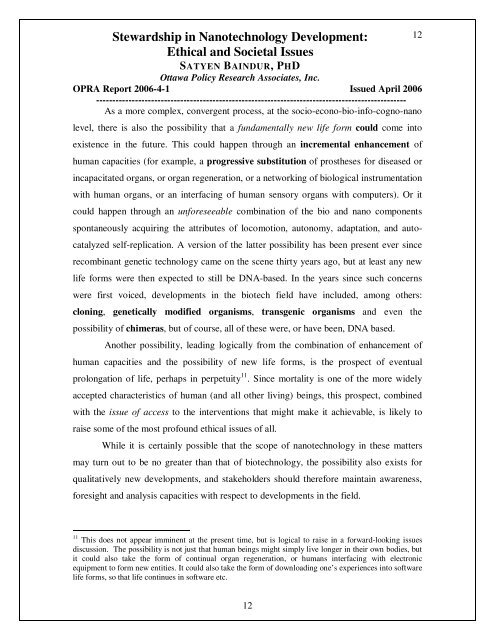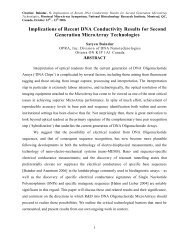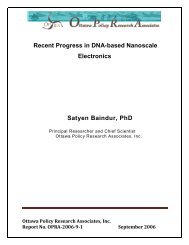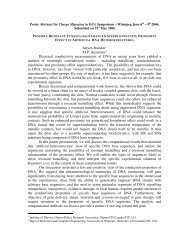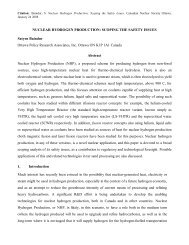Development Ethical and Societal Issues Satyen Baindur PhD
Ethical and Societal Issues - Satyen.Baindur.Org
Ethical and Societal Issues - Satyen.Baindur.Org
You also want an ePaper? Increase the reach of your titles
YUMPU automatically turns print PDFs into web optimized ePapers that Google loves.
Stewardship in Nanotechnology <strong>Development</strong>:<br />
<strong>Ethical</strong> <strong>and</strong> <strong>Societal</strong> <strong>Issues</strong><br />
SATYEN BAINDUR, PHD<br />
Ottawa Policy Research Associates, Inc.<br />
OPRA Report 2006-4-1 Issued April 2006<br />
------------------------------------------------------------------------------------------------<br />
As a more complex, convergent process, at the socio-econo-bio-info-cogno-nano<br />
level, there is also the possibility that a fundamentally new life form could come into<br />
existence in the future. This could happen through an incremental enhancement of<br />
human capacities (for example, a progressive substitution of prostheses for diseased or<br />
incapacitated organs, or organ regeneration, or a networking of biological instrumentation<br />
with human organs, or an interfacing of human sensory organs with computers). Or it<br />
could happen through an unforeseeable combination of the bio <strong>and</strong> nano components<br />
spontaneously acquiring the attributes of locomotion, autonomy, adaptation, <strong>and</strong> autocatalyzed<br />
self-replication. A version of the latter possibility has been present ever since<br />
recombinant genetic technology came on the scene thirty years ago, but at least any new<br />
life forms were then expected to still be DNA-based. In the years since such concerns<br />
were first voiced, developments in the biotech field have included, among others:<br />
cloning, genetically modified organisms, transgenic organisms <strong>and</strong> even the<br />
possibility of chimeras, but of course, all of these were, or have been, DNA based.<br />
Another possibility, leading logically from the combination of enhancement of<br />
human capacities <strong>and</strong> the possibility of new life forms, is the prospect of eventual<br />
prolongation of life, perhaps in perpetuity 11 . Since mortality is one of the more widely<br />
accepted characteristics of human (<strong>and</strong> all other living) beings, this prospect, combined<br />
with the issue of access to the interventions that might make it achievable, is likely to<br />
raise some of the most profound ethical issues of all.<br />
While it is certainly possible that the scope of nanotechnology in these matters<br />
may turn out to be no greater than that of biotechnology, the possibility also exists for<br />
qualitatively new developments, <strong>and</strong> stakeholders should therefore maintain awareness,<br />
foresight <strong>and</strong> analysis capacities with respect to developments in the field.<br />
12<br />
11 This does not appear imminent at the present time, but is logical to raise in a forward-looking issues<br />
discussion. The possibility is not just that human beings might simply live longer in their own bodies, but<br />
it could also take the form of continual organ regeneration, or humans interfacing with electronic<br />
equipment to form new entities. It could also take the form of downloading one’s experiences into software<br />
life forms, so that life continues in software etc.<br />
12


